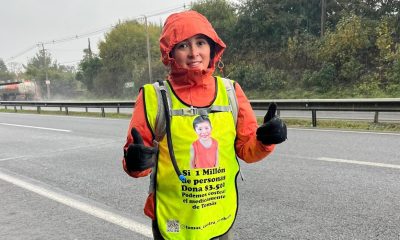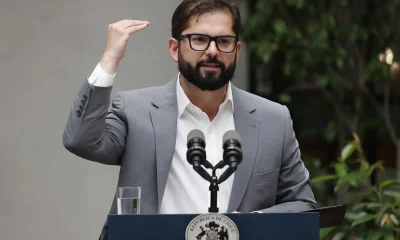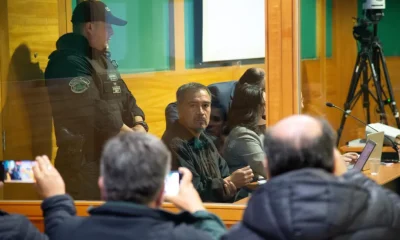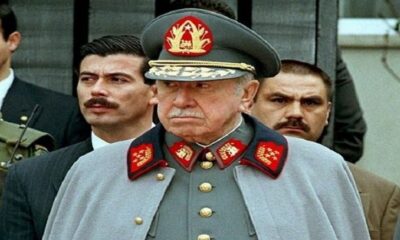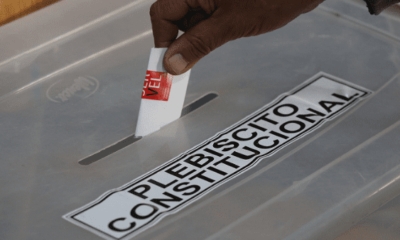International
Chilean mother travels 1,300 kilometers on foot to try to save her son with dystrophy
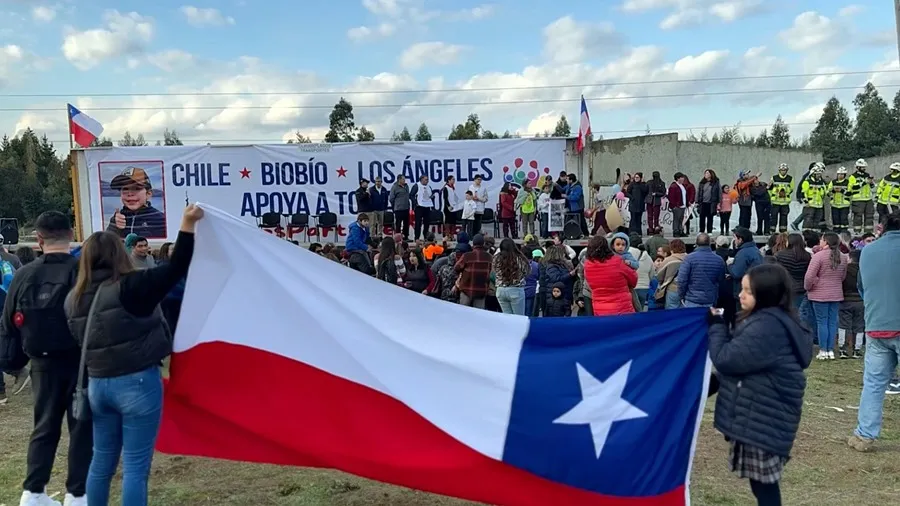
In the city of Ancud, one of the most important of the Chiloe archipelago, in the south of Chile, there is no hospital, so if one of its about 165,000 inhabitants gets sick, he must take the ferry and travel about 50 kilometers to reach the neighboring city of Puerto Montt, the nearest place.
Camila Gómez, a young mother, decided to take a trip but this time to walk to the Palacio de la Moneda, in Santiago de Chile, more than 1,300 kilometers from her home, to raise funds and make visible the drama of her son Tomás, who suffers from Duchenne muscular dystrophy, one of the so-called “rare diseases”, which almost no one worries and no one finances.
Its main objective is to help collect the nearly four million dollars that costs a vital treatment that does not exist in Chile – it must be imported from the United States – and that would help stop the progression of the child’s ailment, barely five years old.
“Tomás has Duchenne muscular dystrophy in a neuromuscular degenerative disease that gradually weakens the muscles, the respiratory system and the heart, which leads to premature death,” he explains in one of the highs of his journey.
“In Chile there is no type of treatment for this disease, but in the United States there are several treatment options, there are three and here they told me that it was not possible to cover a medicine that is abroad. And it motivated me to do this walk, this physical effort,” he adds.
Gómez regrets that no one, neither the precarious public service nor the greedy private insurance, has offered him an exit in the country, although his son “does have options abroad.
“That’s why we decided to walk, to make the disease visible and take it very particularly to collect the 3.9 million dollars that the drug that is administered for the only time in a lifetime costs. So far (its administration) is approved until the age of four and five. Tomás is five and a half years old. So we are against time,” she urges in anguish.
Even so, hope has not been erased from his face and sometimes, especially when asked about solidarity, he outlines a smile of love and trust.
“We are all aware of the great health deficit, that Chile is a country very backward in health, unlike other more developed countries and we are all aware of that. So people have empathized, supported and contributed to the campaign,” he says.
Along with this mother, who left Ancud on April 28, her husband and father of Tomás, Alex Ross, a friend Álvaro Neira and Marco Reyes, president of the Duchenne Families corporation in Chile, who has two teenage children with the same disease and who proposed the Ross Gómez family to the odyssey.
“I am the logistical support for Camila and Marco who have been walking from Chiloé. I assist them on the way, usually with a change of clothes, food, food, I manage the lodging,” explains Alex.
“(Camila) Walk through Tomás, because we are against time, but he also does it so that no mom has to do it,” he says.
Camila’s third objective is to be able to speak in person with the President of the Republic, Gabriel Boric, to urge him to promote a bill to Congress that allows improving the coverage of rare diseases in the country, and medical assistance in rural areas, abandoned by the state in a country where the privatization of health care prevails.
Neira joined the walk because he was moved by Tomás’ suffering but also because he is worried that “in Chile we do not have the means, a clinic where we can have these medicines, that we have to go to this.”
Tomás was diagnosed in March 2023 with Duchenne’s syndrome, the most common but also most severe form of this type of muscular dystrophy that is triggered by a defective gene that affects dystrophin, a protein that helps keep the body’s cells intact.
It causes problems when walking and running, fatigue, learning difficulties and heart and respiratory deficiencies, and those who suffer from it usually have a life expectancy of between 20 or 30 years in difficult conditions.
With more than 700 kilometers of love in her terrified legs, this mother hopes to arrive in the Chilean capital at the end of this month of May from Chiloe, where there is a movement so that the spending on a bridge that they believe is unnecessary, is dedicated to the construction of a perentory hospital
International
Claudia Sheinbaum: Operation Against ‘El Mencho’ Was Based on Pending Arrest Warrants

Mexico’s President Claudia Sheinbaum on Wednesday rejected claims that the military operation that resulted in the death of Nemesio Oseguera Cervantes, known as “El Mencho,” leader of the Jalisco New Generation Cartel (CJNG), was carried out under pressure from the United States government.
Sheinbaum explained that the deployment of federal forces was aimed at executing outstanding arrest warrants against Oseguera Cervantes, who was considered one of the most wanted criminals in both Mexico and the United States.
“That was not the objective (to ease pressure from the United States). It is very important, and I want to repeat it. This individual had an arrest warrant, or several,” Sheinbaum said, referring to the operation conducted on February 22.
According to the president, the initial goal was to capture Oseguera Cervantes, but military forces responded after coming under attack during the intervention.
“The operation was to detain him. The problem is that they were attacked — the Secretariat of National Defense — and they responded at that moment,” she said.
The president insisted that the action was not carried out in response to external demands, although she acknowledged intelligence cooperation with the United States.
“It was not done in any way because of pressure from the United States, not at all. Of course, there was intelligence information from the United States that was used specifically,” she concluded.
International
Spain Denies Any Agreement to Cooperate with U.S. Military in Iran Operations
International
White House Says Spain Agrees to Cooperate with U.S. Military After Trump Threatens Trade Embargo

White House Press Secretary Karoline Leavitt said Wednesday that Spain has agreed “in recent hours” to cooperate with the U.S. military, following President Donald Trump’s threat to impose a trade embargo on Madrid.
Trump had warned of potential commercial measures after Spain reportedly refused to allow the Pentagon to use facilities at Spanish military bases for operations related to Iran.
“With respect to Spain, I think you heard the president’s message yesterday loud and clear, and I understand that in recent hours they have agreed to cooperate with the United States military,” Leavitt said during a press briefing.
She added that the U.S. military is currently coordinating with its counterparts in Spain. However, the president expects broader support.
“The president expects that all of Europe, all of our European allies, of course, will cooperate in this important mission — not only for the United States, but also for Europe,” Leavitt said.
Her remarks came in response to questions about Spain’s position and its role as a U.S. ally amid rising tensions surrounding operations involving Iran.
-

 International4 days ago
International4 days agoIran Reports 201 Dead, 747 Injured After U.S. and Israeli Strikes
-

 International3 days ago
International3 days agoBrazil’s Supreme Court Rejects Bolsonaro’s Bid for House Arrest
-

 International3 days ago
International3 days agoAnti-ICE Billboard Campaign Targets Immigration Spending in 31 U.S. Cities
-

 International4 days ago
International4 days agoPope Leo XIV Urges End to ‘Spiral of Violence’ in Middle East
-

 Sin categoría5 days ago
Sin categoría5 days agoTrump: ‘We Think It’s True’ Amid Claims Iran’s Supreme Leader Was Killed
-

 International2 days ago
International2 days agoSpain’s Prime Minister to Address Nation Amid Trump’s Trade Threats
-

 International5 days ago
International5 days agoSecurity Council to Hold Emergency Meeting on Middle East Crisis
-

 International3 days ago
International3 days agoTrump Warns of ‘Major Wave’ of Attacks as Iran Conflict Escalates
-

 International3 days ago
International3 days agoMexico Calls for Immediate Probe After National Dies in ICE Custody
-

 International2 days ago
International2 days agoNew York Announces First 2,000 Seats in Universal 2-K Program
-

 International19 hours ago
International19 hours agoWhite House Says Spain Agrees to Cooperate with U.S. Military After Trump Threatens Trade Embargo
-

 International19 hours ago
International19 hours agoSpain Denies Any Agreement to Cooperate with U.S. Military in Iran Operations
-

 Central America3 days ago
Central America3 days agoPanama Canal Monitoring Trade as Middle East Conflict Disrupts Shipping
-

 Central America19 hours ago
Central America19 hours agoNicaragua Held Responsible for Harassment of Opposition Prosecutor and His Family
-

 International3 days ago
International3 days agoBolivia Orders Three Investigations Into Deadly Military Plane Crash
-

 International2 days ago
International2 days agoWarner Bros. Developing First ‘Game of Thrones’ Movie With ‘Andor’ Writer
-

 Central America2 days ago
Central America2 days agoGuatemala’s Attorney General Fails in Bid for Top Court Seat Amid Corruption Allegations
-

 International19 hours ago
International19 hours agoClaudia Sheinbaum: Operation Against ‘El Mencho’ Was Based on Pending Arrest Warrants





























